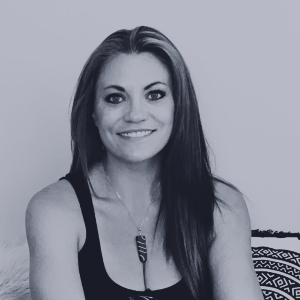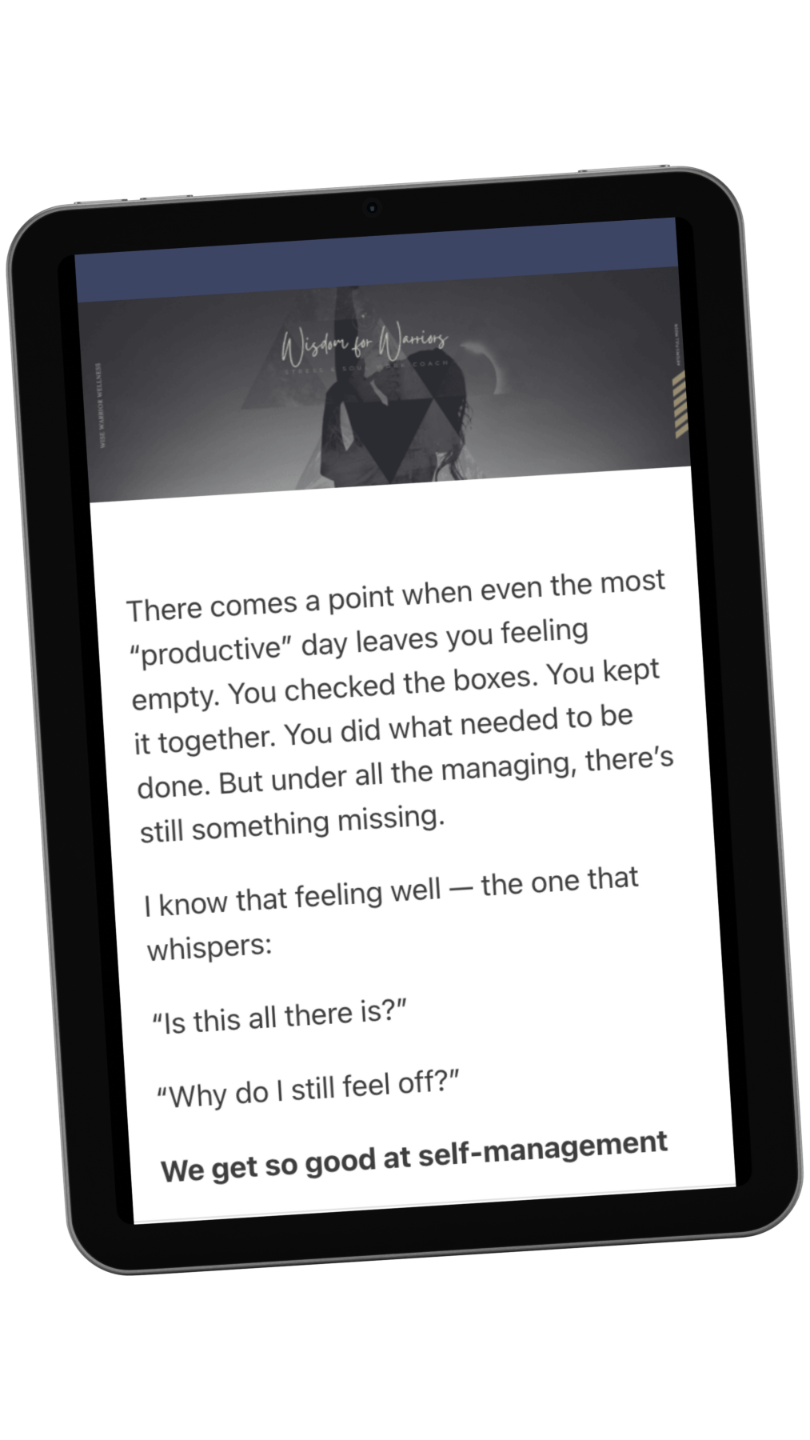Inherited Patterns, Chosen Power
Nov 07, 2025
Sometimes, the most rebellious thing we can do is question what we were taught to never question. Sometimes the most revolutionary thing we can do is speak kindly to ourselves.
There’s a weight you’ve been carrying that isn’t yours.
It was handed to you before you had words. Before you had a choice. Before you even knew, you were learning rules about how to be, how to feel, how to move through the world.
Your parents gave it to you. They got it from their parents. Who got it from theirs. An inheritance of beliefs, patterns, and nervous system responses passed down, much like a genetic code, invisible yet influential.
And here’s what nobody tells you: most of what you inherited was designed for a world that no longer exists.
Including the way you’ve learned to speak to yourself.
The Rules We Didn’t Choose
Your grandmother learned that emotions were dangerous, so she taught your mother to swallow them. Your mother taught you the same. Now you wonder why your body stores stress in your jaw, your shoulders, your gut.
Your grandfather believed that rest was laziness, so he taught your father to work until he was exhausted. Your father taught you the same. Now you wonder why you can’t stop moving, why stillness feels like failure, why your nervous system won’t let you rest even when you’re depleted.
Your ancestors learned that questioning authority was dangerous, that speaking up got you hurt, that safety meant making yourself small. They taught their children, who taught their children, who taught you.
And somewhere along the way, you also learned that being hard on yourself was a form of discipline. That self-criticism was motivation. That speaking to yourself with kindness was a self-indulgent weakness.
Now you’re walking through a completely different world, carrying survival strategies designed for threats that no longer exist, speaking to yourself in a voice that sounds suspiciously like disappointment, never quite good enough, always falling short.
The Violence We’ve Normalized
Let’s talk about something we rarely name: the way we disempower ourselves through our own internal dialogue.
The thoughts that run on repeat:
“I’m so stupid.”
“I always mess this up.”
“I’m too much, not enough.”
“Everyone else has it figured out.”
“I should be further along by now.”
“What’s wrong with me?”
We often say these things to ourselves. Automatically. Without even noticing how violent they are.
Would you speak to someone you love in this way? Would you talk to a child like this? Would you let anyone else speak to you this way?
And yet, we’ve normalized this internal cruelty. We’ve been taught it’s how we stay motivated, how we push ourselves to improve, how we avoid becoming complacent.
But here’s the truth: self-criticism doesn’t make you better. It makes you smaller.
It doesn’t motivate growth. It creates shame. And shame doesn’t transform. Shame paralyzes.
Every time you speak to yourself with harshness, every time you reduce yourself to your mistakes, every time you deny yourself basic kindness, you’re not being disciplined. You’re disempowering yourself. You’re making yourself less capable of the very change you’re trying to create.
The World Has Changed. Have Your Patterns?
Your parents and grandparents lived in a different time. A time when information was scarce, when questioning was costly, when conformity was survival. When being hard on yourself was seen as a sign of strength and self-care was seen as selfish.
They did the best they could with what they knew. They passed down what kept them safe, even when what kept them safe also kept them small.
But you? You have access to information they couldn’t even imagine. You have resources they never had. You live in a world where the old rules don’t just fail to serve you, they actively harm you.
The pattern that kept your grandmother safe, swallowing her truth to keep the peace, that same pattern is now giving you anxiety, digestive issues, and a voice that disappears when you need it most.
The belief that kept your grandfather employed, sacrificing health for productivity, that same belief is now burning you out, stealing your joy, and convincing you that your worth is measured in output.
And the internalized voice that tells you you’re not doing enough, not being enough, not worthy of care until you’ve earned it? That voice is part of the inheritance too. And it’s time to question whether it’s actually serving you.
The Devil You Know vs. The Power You’re Afraid Of
There’s a saying that haunts us: “Better the devil you know than the devil you don’t.”
It’s why we stay in jobs that drain us. Relationships that diminish us. Patterns that hurt us. The familiar pain feels safer than the unknown possibility.
But it’s also why we keep the cruel inner voice. Why we resist self-care. Why we treat ourselves in ways we’d never treat anyone else.
Because somewhere along the way, we learned that being kind to ourselves was seen as a weakness or dangerous. That self-compassion would make us weak, lazy, or complacent.
We learned that suffering was noble. That sacrifice proved worth. That rest had to be earned. That care for ourselves was selfish unless everyone else was taken care of first.
Even when the pattern is clearly not working, even when we can see how it’s depleting us, there’s something deeply familiar about denying ourselves. About pushing through. About making ourselves last on the list.
This is your nervous system trying to protect you with outdated information. It learned early that certain behaviors kept you safe, earned you love, and helped you survive. And even decades later, even in a completely different context, it’s still running the old program of self-denial as a safety mechanism.
The thought pattern that makes you cringe a little when you notice it? That’s the one that needs your attention.
The voice that makes you feel small? That’s inherited conditioning, not your truth.
The belief that you don’t deserve care until you’ve done enough, been enough, achieved enough? That’s programming, not reality.
When Comfort Becomes Self-Sabotage
Here’s the tricky part: some of these old patterns still feel good in a strange way. They still give us that sense of “ahhh, this is familiar.” They still provide a known territory in an uncertain world.
The pattern of never saying no? It might feel safer than risking disappointment. But it’s also why you’re exhausted, resentful, and disconnected from your own needs.
The belief that you have to earn your worth through achievement? It might feel motivating. But it’s also why you can’t rest, why success never feels like enough, why you’re running yourself into the ground.
The habit of putting yourself last? It might feel like kindness. But it’s actually abandonment of yourself, over and over again.
The voice that criticizes you constantly? It might feel like it’s keeping you safe from failure. But it’s actually keeping you small, scared, and disconnected from your own power.
These patterns were appropriate once. For a different time. A different threat. A different version of you who didn’t know there was another way.
But are they appropriate for where you find yourself now? Are they empowering you or diminishing you?
The Nervous System Knows, And So Does Your Body
Your body is carrying all of it. Every unspoken rule. Every inherited belief. Every pattern that was passed down like a family heirloom, you never asked for. Every harsh word you’ve ever said to yourself.
It’s stored in your nervous system as a set point, a baseline of what feels “normal,” even when normal is actually self-abandonment.
Your grandmother’s anxiety about money? It’s in your body as a tightness in your chest every time you think about finances, even when you’re objectively stable.
Your father’s inability to rest? It’s in your body as a constant low-level activation, an inability to truly relax, a guilt that shows up every time you try to pause.
Your mother’s fear of taking up space? It’s in your body as a tendency to apologize for existing, to minimize your needs, to disappear yourself to make room for others.
And your internalized voice of criticism? It’s in your body as chronic tension, shallow breathing, a constant state of bracing for the next way you’ll fall short.
This is why you can’t just think your way out of these patterns. They’re not just beliefs. They’re embodied. They’re wired into your nervous system as truth.
And this is why self-care isn’t optional. It’s not indulgent. It’s not something you do after everything else is handled.
Self-care is how you signal to your nervous system that you’re safe enough to change. That you’re worthy of tenderness. That you don’t have to earn basic kindness.
Reclaiming Power Through How We Speak to Ourselves
True empowerment doesn’t come from pushing harder. It comes from speaking to yourself the way you’d speak to someone you’re trying to help heal.
Every time you catch that critical voice, every time you notice yourself using language that diminishes rather than empowers, you have a choice.
You can continue the pattern. Keep yourself small. Maintain the familiar disempowerment.
Or you can practice something radically different: speaking to yourself as if your words have power. Because they do.
Instead of “I’m so stupid,” try: “I’m learning. That’s human.”
Instead of “I always mess this up,” try: “This is challenging, and I’m working on it.”
Instead of “I should be further along,” try: “I’m exactly where I need to be right now.”
Instead of “What’s wrong with me?” try: “What do I need right now?”
This isn’t toxic positivity. This isn’t pretending everything is fine when it’s not. This is recognizing that the language you use with yourself either empowers or disempowers you. And you get to choose which.
Self-Care as Revolutionary Act
In a world that taught you to put yourself last, to earn rest, and to prove your worth through depletion, choosing to care for yourself is a form of resistance.
Self-care isn’t bubble baths and face masks, though those are nice. Self-care is choosing yourself even when the old pattern says you shouldn’t.
It’s saying no when yes would deplete you.
It’s resting before you collapse.
It’s speaking kindly to yourself even when the critical voice rises up.
It’s setting boundaries with people you love.
It’s prioritizing your nervous system regulation over others’ comfort.
It’s believing you’re worth care before you’ve earned it through suffering.
This feels radical because it is. For generations, your lineage has taught that self-sacrifice is love, that suffering is noble, and that caring for yourself comes last, if at all.
But you have different information now. You know that you can’t pour from an empty cup. That depletion doesn’t serve anyone. Taking care of yourself isn’t selfish; it’s sustainable.
And every time you choose self-care over self-abandonment, you’re not just changing your own pattern. You’re breaking a generational cycle.
Creating Space to Question And to Care
So how do we release what no longer serves when it’s this deeply embedded? How do we shift from self-criticism to self-empowerment when the harsh voice feels so automatic?
It starts with creating enough safety in our nervous system to actually look at what we’re carrying. Because you can’t question your conditioning when you’re in survival mode. You can’t examine patterns when your system is maxed out. And you definitely can’t speak kindly to yourself when your nervous system is convinced you need to be punished into improvement.
This is why regulating your nervous system isn’t just about feeling calmer. It’s about creating the internal conditions that make change possible. Where self-compassion becomes accessible. Where you can actually hear yourself over the inherited voices of criticism and control.
When your nervous system is calm enough, regulated enough, resourced enough, something shifts. You can finally see the patterns instead of just living them. You can question the beliefs instead of just following them. You can speak to yourself with tenderness instead of cruelty.
You can hold inherited conditioning up to the light and ask: Is this mine? Does this empower me? Does this help me thrive? Or does it keep me small, scared, and separate from my own power?
And if the answer is no, if the answer makes you feel a little lighter, a little freer, a little more like yourself, then you know what needs to be released.
The Cringe Is the Signal And So Is the Resistance
Pay attention to what makes you cringe when you notice it. That slight recoil, that flash of recognition, that moment of “oh god, I sound just like my mother or father.”
That’s not shame. That’s awareness trying to break through.
And pay attention to your resistance to self-care. To the voice that says “I don’t have time,” or “other people need me more,” or “I’ll rest when everything is done.”
That resistance? That’s inherited conditioning protecting itself. Because if you start prioritizing your wellbeing, if you start speaking kindly to yourself, if you start believing you’re worth care just because you exist, the old pattern loses its power.
The belief that makes you defensive when challenged? Examine it.
The pattern that feels automatic but leaves you feeling depleted? Question it.
The behavior that everyone in your family does but doesn’t actually nourish you? Release it.
The voice that tells you you’re not enough? Recognize it as learned, not true.
You’re allowed to keep what works and release what doesn’t. You’re allowed to honor your lineage while also choosing differently. You’re allowed to speak to yourself with kindness, even if no one modeled that for you.
What Empowered Release Actually Looks Like
Releasing inherited conditioning isn’t a one-time event. It’s a practice. A returning. A gentle, persistent choosing of empowerment over the familiar patterns of self-diminishment.
It starts with noticing. Where do your automatic reactions come from? Which critical thoughts aren’t actually yours but feel like they are? What patterns of self-abandonment keep showing up that you never consciously chose?
Then it moves into feeling. Where does this conditioning live in your body? What happens in your nervous system when you bump up against these old rules? What would it feel like to speak to yourself differently?
And then it requires the radical act of self-care. Of choosing yourself. Of using language that empowers rather than diminishes.
This might look like:
Setting a boundary that your mother never could, and not apologizing for it
Resting when your father would have pushed through, and calling it strength, not weakness
Speaking up when your grandmother would have stayed silent, and trusting your voice matters
Choosing your wellbeing over others’ comfort, without guilt
Questioning beliefs that were never yours to begin with
Speaking to yourself the way you wish someone had spoken to you
Prioritizing your needs without earning permission first
Believing you’re worth care simply because you’re alive
And here’s what’s beautiful: every time you make a different choice, every time you speak to yourself with kindness instead of criticism, you don’t just free yourself. You free your lineage.
Breaking the Chain Through Empowerment
When you release a pattern that’s been passed down for generations, when you choose self-empowerment over self-criticism, when you practice self-care in a lineage that practiced self-sacrifice, you’re not just healing yourself.
You’re healing backward, releasing your ancestors from patterns they couldn’t break. And you’re healing forward, ensuring these patterns don’t get passed to whoever comes after you.
You become the pivot point. The place where self-abandonment stops and self-empowerment begins.
This is sacred work. It’s brave work. And it requires support.
Because releasing deeply embedded conditioning while speaking harshly to yourself? Nearly impossible. But releasing it from a place of self-compassion, regulated nervous system, and genuine care for your wellbeing? That’s where transformation actually happens.
The Practice of Empowered Release
When you notice an inherited pattern showing up, when you catch yourself speaking to yourself with inherited cruelty, try this:
Pause. Before you follow the pattern automatically, before you let the critical voice continue, just pause. Create a moment of space between stimulus and response.
Name it. “This is my mother’s self-criticism, not mine.” “This is my father’s inability to rest, not my truth.” “This is inherited conditioning, not who I am.” “This is learned cruelty, not what I deserve.”
Breathe with it. Feel where it lives in your body. Notice the pull to follow the familiar path of self-diminishment. Don’t judge it. Just feel it.
Speak differently. This is the moment of power. Replace the critical voice with something truer: “I’m doing my best.” “I’m worthy of care.” “I’m learning and that’s enough.” “I deserve kindness, especially from myself.”
Choose self-care. Even if it feels uncomfortable. Even if it goes against everything you were taught. Ask yourself: What do I actually need right now? Then give yourself permission to receive it.
Move differently. Make the choice that empowers you, not the one that keeps you small. Rest instead of pushing. Speak instead of silencing. Care for yourself instead of waiting to earn it.
Return to regulation. Because choosing differently will activate your nervous system. It will feel like danger even when it’s actually freedom. So tend to yourself. Regulate. Remind your body you’re safe. Remind yourself you’re worthy.
This Is the Work
The Healing Frequency isn’t just about feeling better in the moment. It’s about creating the internal conditions where you can finally release what you’ve been carrying that was never yours to carry.
It’s about calming your nervous system enough to see the patterns clearly. Regulating your state enough to question what you’ve always accepted. Resourcing yourself enough to choose self-empowerment over self-criticism. Practicing self-care enough to believe you’re worth it.
Because you can’t release conditioning from survival mode. You can only replicate it. You can’t speak kindly to yourself when your system is convinced that cruelty keeps you safe. You can’t choose self-care when you’re running on the belief that depletion proves worth.
True release, the kind that actually shifts your patterns instead of just understanding them intellectually, requires a regulated nervous system, genuine self-compassion, and the revolutionary belief that you’re worth caring for.
An Invitation to Supported Empowerment
If you’re ready to examine what you’ve been carrying, if you’re ready to question the conditioning that keeps you disempowered and self-critical, if you’re ready to release inherited patterns and choose self-care as a radical act, I want to invite you into a space designed specifically for this transformation.
The Healing Sanctuary is where we do this work together. Not through force or harsh discipline, but through gentle, persistent attention to the conditioned parts of ourselves that have been running the show.
Inside the Sanctuary, we work with these inherited patterns with curiosity instead of judgment. We meet the voices of criticism with compassion. We examine the beliefs about our worth not to shame ourselves for having them, but to understand where they came from so we can consciously choose what we keep.
We give ourselves grace for what is true right now. For the patterns that still show up even when we know better. For the critical voice that still rises even when we’re trying to be kind. For the moments we fall back into old conditioning because it feels safer than the unknown.
And we hold space for where we want to be in the future. Not as a weapon to beat ourselves with for not being there yet, but as a vision that guides our gentle, consistent choices toward empowerment.
This is healing that honors the complexity of change. That recognizes we can’t shame ourselves into transformation. That understands the path from inherited conditioning to conscious choice isn’t linear, and that’s okay.
We work with our nervous systems, not against them. We practice self-care as a foundation, not a reward. We speak to ourselves as if our words create our reality, because they do.
Because you don’t have to keep carrying what was handed to you. You don’t have to keep speaking to yourself in voices that diminish you. You don’t have to keep putting yourself last until you’ve earned the right to care.
You’re allowed to honor where you are while moving toward where you want to be. You’re allowed to give yourself grace for the patterns that still show up while also choosing differently. You’re allowed to work with your conditioning gently, patiently, with the kind of tenderness that actually creates lasting change.
The weight you’ve been carrying? Most of it isn’t yours. The critical voice? That’s learned, not truth. The belief that you’re not worth caring about? That’s conditioning, not reality.
And the moment you realize that, the moment you’re held in a space that supports both your current truth and your future vision, that’s when real transformation becomes possible.
Let’s do this work together. In a space that honors where you are. That supports where you’re going. That gives you the tools, the practices, and the grace to move from inherited conditioning to conscious empowerment.
Your ancestors did the best they could. They survived. Now it’s your turn. Not just to survive, but to thrive. To speak kindly. To care deeply. To empower fully.
And you don’t have to do it alone. You don’t have to figure it all out before you begin. You just have to be willing to meet yourself with compassion, work with your patterns with curiosity, and trust that change happens not through force, but through the consistent choice to honor both where you are and where you’re becoming.
That’s not betrayal of your lineage. That’s evolution. That’s the healing they couldn’t access becoming possible through you. And The Healing Sanctuary is where we hold space for exactly that becoming.







